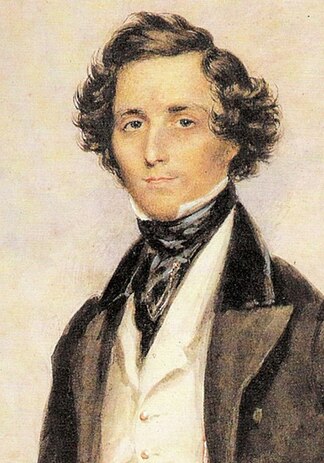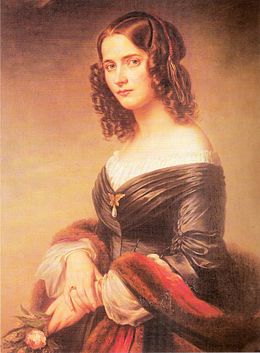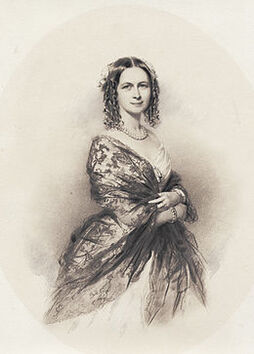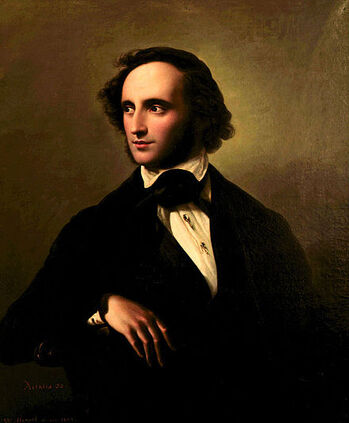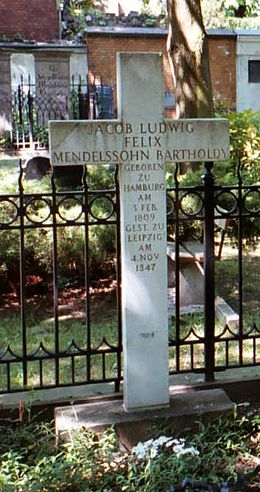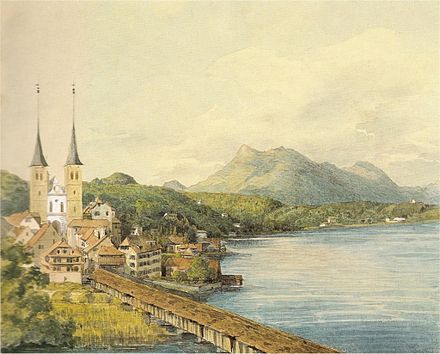|
Jakob Ludwig Felix Mendelssohn Bartholdy (3 February 1809 – 4 November 1847), born and widely known as Felix Mendelssohn, was a German composer, pianist, organist and conductor of the early Romantic period. Mendelssohn's compositions include symphonies, concertos, piano music and chamber music. His best-known works include his Overture and incidental music for A Midsummer Night's Dream, the Italian Symphony, the Scottish Symphony, the oratorio Elijah, the overture The Hebrides, his mature Violin Concerto, and his String Octet. Mendelssohn's Songs Without Words are his most famous solo piano compositions. Felix Mendelssohn was born on 3 February 1809 in Hamburg, at the time an independent city-state into a prominent Jewish family. His father was philosopher Moses Mendelssohn. Felix Mendelssohn grew up in an intellectual environment and was recognised early as a musical prodigy, but his parents were cautious and did not seek to capitalise on his talent. Mendelssohn began taking piano lessons from his mother when he was six, and at seven was tutored by Marie Bigot in Paris. Later in Berlin, all four Mendelssohn children studied piano with Ludwig Berger, who was himself a former student of Muzio Clementi. From at least May 1819 Mendelssohn studied counterpoint and composition with Carl Friedrich Zelter in Berlin whose tastes in music were conservative, was also an admirer of the Bach tradition. This undoubtedly played a significant part in forming Felix Mendelssohn's musical tastes, as his works reflect this study of Baroque and early classical music. His fugues and chorales especially reflect a tonal clarity and use of counterpoint reminiscent of Johann Sebastian Bach, whose music influenced him deeply. Mendelssohn probably made his first public concert appearance at the age of nine, when he participated in a chamber music concert accompanying a horn duo. He was a prolific composer from an early age. As an adolescent, his works were often performed at home with a private orchestra for the associates of his wealthy parents amongst the intellectual elite of Berlin. Between the ages of 12 and 14, Mendelssohn wrote 12 string symphonies for such concerts, and a number of chamber works. His first work, a piano quartet, was published when he was 13. At age 16 Mendelssohn wrote his String Octet in E-flat major, a work which has been regarded as "mark[ing] the beginning of his maturity as a composer."This Octet and his Overture to Shakespeare's A Midsummer Night's Dream, which he wrote a year later in 1826, are the best-known of his early works. The Overture is perhaps the earliest example of a concert overture – that is, a piece not written deliberately to accompany a staged performance but to evoke a literary theme in performance on a concert platform. Besides music, Mendelssohn's education included art, literature, languages, and philosophy. He had a particular interest in classical literature and translated Terence's Andria for his tutor Heyse in 1825 whose impressed and had it published in 1826. This translation also qualified Mendelssohn to study at the Humboldt University of Berlin, where from 1826 to 1829 he attended lectures on aesthetics by Georg Wilhelm Friedrich Hegel, on history by Eduard Gans, and on geography by Carl Ritter. In 1821 Zelter introduced Mendelssohn to his friend and correspondent Johann Wolfgang von Goethe (then in his seventies), who was greatly impressed by the child, leading to perhaps the earliest confirmed comparison with Mozart in the following conversation between Goethe and Zelter:
Mendelssohn was invited to meet Goethe on several later occasions, and set a number of Goethe's poems to music. His other compositions inspired by Goethe include the overture Calm Sea and Prosperous Voyage (Op. 27, 1828), and the cantata Die erste Walpurgisnacht (The First Walpurgis Night, Op. 60, 1832). In 1829, with the backing of Zelter and the assistance of the actor Eduard Devrient, Mendelssohn arranged and conducted a performance in Berlin of Bach's St Matthew Passion. The success of this performance, one of the very few since Bach's death and the first ever outside of Leipzig, was the central event in the revival of Bach's music in Germany and, eventually, throughout Europe. It earned Mendelssohn widespread acclaim at the age of 20. It also led to one of the few explicit references which Mendelssohn made to his origins: "To think that it took an actor and a Jew's son to revive the greatest Christian music for the world!" Over the next few years Mendelssohn travelled widely. His first visit to England was in 1829; other places visited during the 1830s included Vienna, Florence, Milan, Rome and Naples, in all of which he met with local and visiting musicians and artists. These years proved to be the germination for some of his most famous works, including the Hebrides Overture and the Scottish and Italian symphonies. He became well received in his travels throughout Europe as a composer, conductor and soloist. On Zelter's death in 1832, Mendelssohn had hopes of succeeding him as conductor of the Singakademie; but at a vote in January 1833 he was defeated for the post. Following this rebuff, Mendelssohn divided most of his professional time over the next few years between Britain and Düsseldorf, where he was appointed musical director (his first paid post as a musician) in 1833. Mendelssohn first visited Britain in 1829, where Moscheles, who had already settled in London, introduced him to influential musical circles. He made ten visits to Britain, lasting about 20 months, where he composed and performed, and also edited for British publishers the first critical editions of oratorios of Handel and of the organ music of J. S. Bach. His essentially conservative musical tastes set him apart from more adventurous musical contemporaries such as Franz Liszt, Richard Wagner, Charles-Valentin Alkan and Hector Berlioz. The Leipzig Conservatory, which he founded, became a bastion of this anti-radical outlook. After a long period of relative denigration due to changing musical tastes and antisemitism in the late 19th and early 20th centuries, his creative originality has been re-evaluated. He is now among the most popular composers of the Romantic era. Mendelssohn married Cécile Charlotte Sophie Jeanrenaud (10 October 1817 – 25 September 1853), the daughter of a French Reformed Church clergyman, on 28 March 1837, and they had 5 children together. In October 1844, Mendelssohn met Swedish soprano Jenny Lind and they met and worked together many times, and Mendelssohn became increasingly closer to her. Papers confirming their relationship had not been made public. Upon Mendelssohn's death, Lind wrote that Mendelssohn was "the only person who brought fulfilment to my spirit, and almost as soon as I found him I lost him again." In 1849, she established the Mendelssohn Scholarship Foundation, which makes an award to a young resident British composer every two years in Mendelssohn's memory. Mendelssohn suffered from poor health in the final years of his life, probably aggravated by nervous problems and overwork. A final tour of England left him exhausted and ill, and the death of his sister, Fanny caused him further distress. Less than six months later, on 4 November, aged 38, Mendelssohn died in Leipzig after a series of strokes. Mendelssohn had once described death, in a letter to a stranger, as a place "where it is to be hoped there is still music, but no more sorrow or partings." Mendelssohn was an enthusiastic visual artist who worked in pencil and watercolour, a skill which he enjoyed throughout his life. His correspondences indicate that he could write with considerable wit in German and English.
0 Comments
Leave a Reply. |
Categories
All
Archives
December 2023
|
